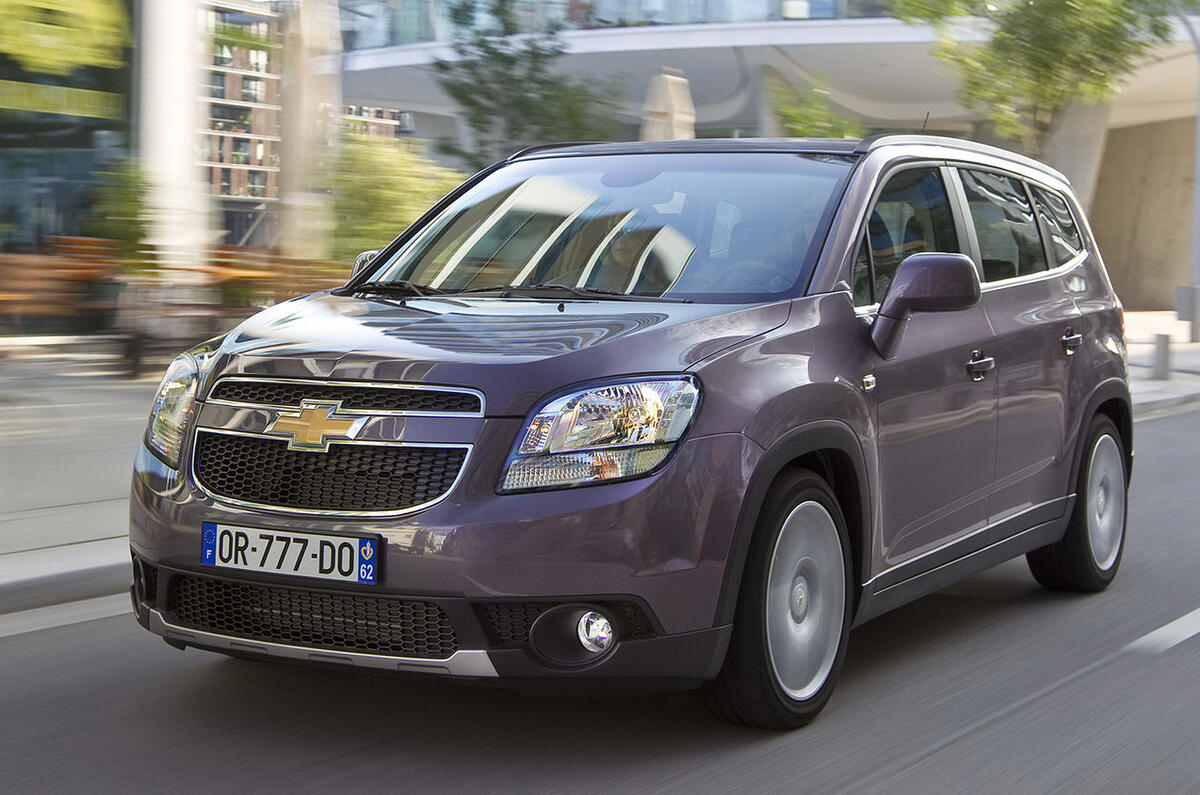What is it?
This is Chevrolet’s entry into the hard-fought European market for compact seven-seat MPVs. Or, to look at it another way, it’s a Korean-designed and Korean-built Astra-based people carrier.
Although its boxy, faux-SUV styling suggests otherwise, the Orlando is just 4.6m long. Inside it has seatbelts for seven, with the third row made up of two individual seats that can be folded flat into the floor.
The middle bench seat has a 40/20 split fold and an adjustable backrest angle. With the back of the bench folded flat, the Orlando offers a virtually flat load bay through to the front seats, though it’s not very deep.
There’s a choice of three engines, when the Orlando goes on sale next spring. The entry-level unit is a 139bhp 1.8 petrol, followed by a de-tuned 128bhp 2.0-litre turbo diesel and the full-fat, 161bhp, 2.0-litre turbo diesel.
The petrol engine gets a five-speed manual ‘box, the diesel a six-speed. A six-speed auto’ is also optional on the diesel.
Prices start at £16,395 for the 1.8 Orlando in base LS spec (which includes air-con, six airbags, remote locking and an adjustable steering wheel). The entry diesel model costs £17,695. The range-topper diesel auto’ LTZ Executive (which gets sat-nav, leather and heated seats) costs £23,195.
What’s it like?
Although the Orlando is based on the same Delta platform as the Astra, it feels a size bigger. The cockpit is roomy, with plenty of shoulder space and the steeply sloping centre console presents the controls at very useable angle. The gear lever and handbrake are also particularly well-placed.
Aside from the ubiquitous mega-cupholders between the front seats there’s a small console bin and the very clever cubbyhole hidden behind the stereo’s fascia, which pivots up and over for access.
Middle row passengers get decent knee and headroom, while the third row has headroom for adults but child-only legroom. Plastic quality in the cockpit is pretty good, but rather more prosaic in the cabin and boot.
Overall, though, the Orlando feels robustly and honestly constructed. Inside, it doesn’t disguise its role as a family workhorse, even if the exterior – with its eye-catching grille design and brash detailing – suggests something more engaging.
Although the Orlando is hardly about pure driving pleasure, the range contains a big surprise. The 1.8 petrol unit is quite smooth and decently refined, but would probably be marginal will a full compliment of passengers. The 1.4-litre petrol turbo due later next year will be a better bet.
However, potential Orlando buyers should look no further than the 2.0-litre diesel engine, especially when hooked up to the six-speed autobox.
This engine – in stark contrast to the unit fitted to the Insignia - is refined, punchy and smooth and well matched to the slick six-speed manual. But it’s also particularly impressive in conjunction with the autobox.
According to Orlando vehicle line director Wilhelm Reinheimer, this ‘Family Z’ engine is a Korean design, based on an old Euro IV-compatible unit, but extensively re-engineered. He also says that the Korean expertise with automatic transmissions is the reason for the unusually slick pairing of a diesel and torque converter auto.















Join the debate
Add your comment
Re: Chevrolet Orlando 2.0 VCDi
Re: Chevrolet Orlando 2.0 VCDi
Re: Chevrolet Orlando 2.0 VCDi
Have you tried it FRF? Are you speaking from experience? Have you just spent two years enduring a top of the range Chevy product? Do you have first-hand experience of their flimsy interiors?
I might consider doing just that if it weren't for the fact that the nearest Chevy dealer to me is well over an hour away and I have better things to do with my time.
Not according to the latest JDPower results. Chevy is bottom of the manufacturer league tables with it's lowest score ever. Getting worse rather than improving.